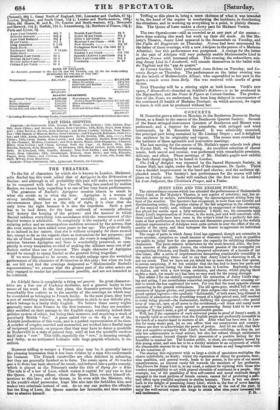An Adelphi farce is completely a thing sui generis. Its
great character- istics are a free use of Cockney drolleries, and a general laxity in two senses of the word. In the first place, the dramatis personre have those remarkably free notions as to the sanctity of the marriage tie which may be considered as belonging to French laxity. In the next place, they have a sort of rambling tendency, an indisposition to stick to any definite plot, which belongs to a laxity truly English. We believe these merry wights generally came from France in the first instance; but they are consider- ably modified on their passage to the English stage, retaining indeed their pristine system of ethics, but losing their neatness, and acquiring a stock of' peculiarly British "fun." A piece called Out on the Sly is one of the Adelphi productions of this week, and is a perfect representation of its class. A number of couples, married and unmarried, are worked into a fearful state of reciprocal jealousy, on purpose that they may have to dance a quadrille at Rosherville in a state of general fury, until at last the quadrille resolves itself into a "row." This trifle, especially the "row," is amusing enough; and Selby, as an antiquated Lothario with large grayish whiskers, is ex- cellent.


























 Previous page
Previous page